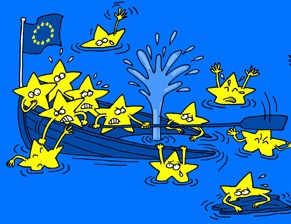Europe is living one of its most significant changing eras. In this time of uncertainty, even its identity and its bedrocks are being put in doubt. We can no longer take European unity for granted. We saw it a couple of months ago. At that time, what created incertitude were the political elections that were near to be held.

According to some forecasts, the German Chancellor Angela Merkel could lose power, while Marine Le Pen and Geert Wilders were expected by more than a few to win in France and Netherlands. In addition, the British Prime Minister Theresa May was likely to gain the majority, despite her tragic election campaign. But reality sometimes goes beyond expectations, and surprisingly for somebody this is not what happened. Merkel maintained her approval and the Euro-skeptical and extreme right-wing Le Pen and Wilders eventually lost. However, the threat towards European unity is not over as it seems.
Even if Pro-Europe candidates won in France, Germany and Netherlands, this seems to be the exception to the rule all over Europe, since “Europeism” won basically in the original six members of the European Economic Communities (Germany, France, Belgium, Netherland, Luxemburg and more ambiguously Italy).
But, in the meantime countries such as Hungary and Poland are getting closer to illiberal policies, which are in contrast to the angular stones laid by the Treaty of Rome. Recently, these counties have changed their immigration policies, so now asylum seekers are facing detention or expulsion, changes that are contrary to EU law and the European Convention on Human Rights.
Moreover, countries that only in the last years were freed by the troublesome times of Communism, look like being inclined to embrace Vladimir Putin, the man who stated that the “fall of the Soviet Union was the greatest geopolitical catastrophe of the twentieth century“. Among these, especially Hungary, since the Prime Minister Victor Orbán appears to be very close to the Russian President.
In the north, Ireland proceeds along with the original six, while Denmark remains sceptical as regards the values of further integration. In addition, Spain, Portugal and even Greece are seeing light at the end of the tunnel, after years of economic and political instability.
In other words, Europe’s political framework looks like a kaleidoscope. And don’t forget to consider the UK’s position, or better, “op-position” towards Europe. Brexit still echoes, while its negotiations haven’t begun, yet. The British Prime Minister Theresa May is navigating dangerous water: her power is in tatters both at home and abroad. In Britain, she was criticized over her reaction in the Grenfell Tower disaster, but also over the cuts to police budgets that she established when she was the secretary and that provoked some negative judgements after the terrorist attacks in UK. Moreover, her party lost its majority in a snap election last month, but the safe passage of the Queen’s Speech at least gave May some comfort at the most challenging of times.
On the foreign front, May’s credibility is put in doubt especially after the European summit which took place in Brussels on 22/23 June, where the UK government’s proposals for the rights of EU citizens after Brexit were judged “not sufficient” by European Commission President Jean-Claude Juncker. And also the other European leaders didn’t wait to scream blue murder at them.
So, months ago the European Council President, Donald Tusk, said that the European Union was facing threats that were “more dangerous than ever”. He identified three key challenges that the EU must tackle. We already mentioned the first two: the rise of anti-EU, nationalist sentiment across the continent, plus the fact that the so called “Dutch Trump” (Geert Wilders) could win in the Netherlands. But while these issues seem to be resolved – though perhaps only temporarily – the third threat remains. And it is represented by the new geopolitical reality that has witnessed an increasingly assertive Russia and China and instability in the Middle East and Africa, which resulted also in the migration crisis impacting Europe’s politics.
A contribution to this sense of instability comes from Washington, which has publicly endorsed Brexit and attacked the European Union a number of times.
However, this political framework goes along stronger economic data. After several years of slow growth, the Eurozone economies are now expanding faster than expected. For this reason, many Europeans leaders believe that recent economic and political news has brought in at least a temporary respite and potentially a “window of opportunity” to move forward. And the change will pass through the improvement of the internal and external security in Europe, and in particular the new European security pact, which comprehends measures to improve security and border protection and greater EU intelligence cooperation to highlight the resilience of the EU project.
Now, European leaders might feel that the “Eurosceptic” wave has passed its peak and that a window of opportunity exists to make progress with a new EU integration agenda.
The decisions that will be taken in coming months will help define the longer-term political and economic character of the EU and built (or re-built) the puzzle of its identity, which is still threatened.
Visits: 202

